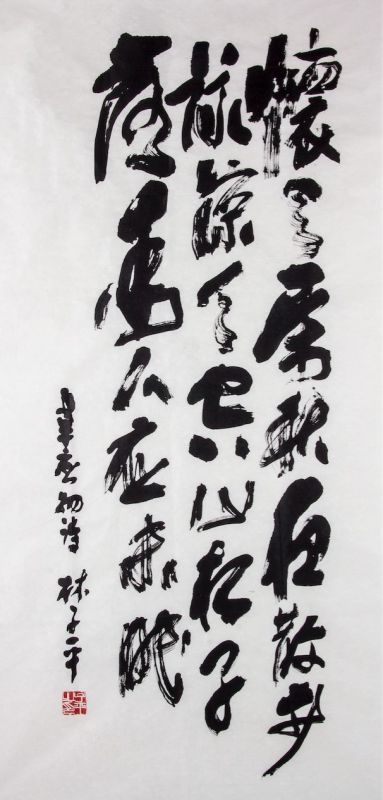Lim Tze Peng
LP 秋夜寄邱員外 - 韋應物 (On an Autumn Night to Councillor Qiu by Wei Ying Wu)
Ink on Paper, 140 x 70 cm
USD 8,200 – 10,200
Chat with us on WhatsApp
About the artwork
怀君属秋夜,散步咏凉天。空山松子落,幽人应未眠。 The poem you provided is by Wei Yingwu (韦应物), a renowned poet of the Tang dynasty. The poem reads as follows: 怀君属秋夜,散步咏凉天。 空山松子落,幽人应未眠。 Here is a translation and interpretation of its meaning: 怀君属秋夜 (“Thinking of you on this autumn night”) The poet expresses his thoughts about someone dear to him (君, often referring to a friend or respected person) during the quiet of an autumn night. The season and time of night evoke feelings of nostalgia and longing. 散步咏凉天 (“I walk and chant under the cool sky”) The poet takes a walk, perhaps to ease his mind, and as he walks, he chants or reflects on the coolness of the autumn evening. This suggests that his thoughts are intertwined with the serene atmosphere of the season. 空山松子落 (“In the empty mountains, pine cones fall”) The scene shifts to nature, where the mountains are described as “empty” or quiet, emphasizing solitude. The falling pine cones symbolize the passage of time in a still, undisturbed setting. This mirrors the poet’s own quiet reflection. 幽人应未眠 (“The recluse is likely still awake”) The poet imagines that a hermit or recluse (幽人), someone who lives in seclusion, is also awake at this hour, unable to sleep. This line evokes a sense of shared solitude, suggesting that, like the poet, others too may be lost in thought or contemplation during the stillness of the night. Overall Meaning: The poem conveys a feeling of quiet reflection, solitude, and perhaps a sense of melancholy. Wei Yingwu is thinking of a friend or someone dear to him during an autumn night, and while taking a walk under the cool sky, he reflects on the peaceful but solitary scene of the mountains. The falling pine cones represent the stillness and loneliness of nature, and the poet imagines that he is not alone in his sleepless contemplation—he shares this quiet solitude with others, perhaps even with the recluse in the mountains. This poem touches on themes of nature, solitude, and the passage of time, common in Tang poetry, where poets often found solace or reflection in natural landscapes.
About the artist
Born in Singapore in 1921, Lim Tze Peng is one of Singapore’s most significant artists and a living legend. Renowned for his Chinese ink creations of post-independence Singapore, he also practices Chinese calligraphy. Alongside local and international exhibitions, his masterpieces are exhibited in prominent Singapore institutions and part of many prestigious collections. Lim has been bestowed several awards including the Special Prize at the Commonwealth Art Exhibition in England in 1977 and the prestigious Cultural Medallion in Singapore in 2003. In May 2012, he broke records with the sale of his works at a Christies auction in Hong Kong.


.jpg)

